The following information was compiled from contributions from the farm families being recognized, and the cooperating agency personnel for presentation at the Jackson County Chamber of Commerce’s 2019 Farm City Breakfast by Doug Mayo, County Extension Director, UF/IFAS Jackson County Extension.
–

Emma Caraway – Ed Jowers “Future of Agriculture” Scholarship Recipient
Emma is a 2019 graduate of Victory Performing Arts Academy graduating with a 3.8 GPA. While in school, she was actively involved with 4-H, TeenPact Leadership School, dance, and was a youth leader in her church. Along with these various activities, she also helped care for her parent’s and grandparent’s farms.
Agriculture is something that Emma takes seriously. In her application she stated, “Agriculture is so much a part of who I am…”. “I have a deep family heritage in it, and so much of my work and hobbies are submersed in it. It is a way of life I wish all could experience.”
Her high school achievements and activities were extensive and immersed with agriculture related achievements. She has competed and won at various livestock shows across Florida, Georgia, and Alabama. She has also successfully competed in livestock judging in all 3 states, meats judging at the state level, and competed in poultry judging at both the state and national level.
Emma also exhibited exemplary leadership abilities within her church, with her extensive involvement with the TeenPact Leadership School, and by meeting with representatives and senators at the state Capitol to lobby for 4-H. Meghan Austin, Scholarship Committee Chair said, “There are truly too many achievements to list. Trust me when I say that Emma is the epitome of what the Ed Jowers Scholarship recipient should be.”
Emma is currently continuing her education at Chipola College with the goal of transferring to Abraham Baldwin Agricultural College where she wants to pursue a degree in Agriculture Education. Her goal is to help the public understand the importance of agriculture, how their food is produced, and where their food comes from.
Each year the Jackson County Chamber of Commerce awards the Ed Jowers Farm City “Future of Agriculture” Scholarship to a recipient displaying exemplary scholastic, extracurricular, and agriculturally centered achievements.
–
Bud Baggett 2019 Outstanding Farm Family
Bud Baggett is a 3rd generation Jackson County farmer. His grandfather, Ellis Baggett purchased land in the county in 1962, and moved up from Calhoun County. He raised his son Larry to carry on the family tradition of farming, who passed it on to Bud. Larry and Carolyn were recognized as the Outstanding Farm Family in 2001, so Bud carries on the family tradition of excellent farming and support of the agricultural industries in Jackson County.
Bud grew up on the farm located south of Marianna on Highway 71 and has been there ever since. He fell in love with the life of raising crops and cattle. When asked to describe what made this life so attractive, he said, “It is rewarding to watch something grow and to get to harvest the results of your efforts. You get to do it yourself from start to finish.” At age 19 grew his first 90 acres of peanuts on his own. From then on, he and Larry have been farming separately, but always there to help each other be successful.
Today Baggett Farms consists of 5,500 acres with 9 full time employees in addition to Larry & Bud. They grow peanuts, cotton, cattle and oats for seed. To add income and help cover the cost of their expensive harvest equipment, Bud and his crew provide custom harvesting service for both field corn and cotton on local farms. In addition to their 50 head commercial cow herd, they also annually background 1,000 stocker cattle on irrigated fields over the winter following crop harvest. To round out the diversity of the farm they also had planted timber prior to the storm.
Hurricane Michael was devastating for everyone in the path of the storm, but it was especially challenging for local farmers whose entire business was exposed to the brunt of the 130+ mph winds. Timber tracts were destroyed, farm buildings and barns were damaged or demolished, center pivot irrigations systems were twisted, and mangled, the cotton crop was a complete loss, peanuts were shaken lose from the vine, fences were ruptured by downed trees, and farm roads were impassible. Plus, their homes were damaged just like the rest of ours.
People in the county responded to this tragedy in various ways, but Bud Baggett was one of the farmers who made a real difference by leading the charge to get financial help for the farming community. He made at least six trips to Tallahassee to speak with the Senate Ag Committee, as well as individual representatives. Bud was a spokesman for the farming community sharing both his story and those of his neighbors, so they understood the enormous challenge faced by area farmers. He and his wife Desiree hosted three different tour groups of decisions makers at his farm, so they could see first-hand the level of devastation and the size of the challenge farmers in this area faced to recover. Bud knew that with the lost income, and overwhelming damage, farmers need help to get ready to farm again this year. That was the only hope to begin to dig out of this huge hole. Through his efforts and others working through Farm Bureau and other farm organizations, Governor DeSantis did listen and created the “Bridge Loan Program” to provide two-year 0 interest loans to fill the gap before federal aid becomes available. Because of Bud’s efforts more than 70 crop farmers were able to borrow almost 13 million dollars to help them recover and get the financing needed to farm again this year. The feeling in Tallahassee was that assisting farmers with recovery was the role of the federal government, but Bud and other local leaders made sure they understood that farmers could not wait and needed help right away.
When asked about the future of Baggett Farms Bud replied, “I just hope to fully recover from the storm. Right now, we are just trying to get back on track and back to normal.” He said that even before the storm farming has been a constant struggle with so many variables, including weather, commodity markets, trade wars, rising expenses, and razor thin margins. According to Bud, his only answer is to further diversify and utilize precision technology to maximize efficiency to be able to survive on small margins. To do this he hopes to convert some of the best land that had been in timber to pasture and increase his cowherd to around 300 head, and only replant timber on his marginal land.
Bud and his wife Desiree have been married for nine years. He has three kids, Grace – 20, Sam – 12, and Connor – 8. Desiree owns the Wild Hair Salon in Marianna, but also helps Bud on the farm keeping the books, paying bills and farm records. Bud is also the owner of the Crosshairs Gun Shop located behind Wild Hair that specializes in custom guns for concealed carry.
When asked about the Farm Family recognition Bud replied, “It is quite an honor. There are not many young folks farming these days, so I truly appreciate this recognition.” He also said, “I am very thankful for my Dad. We work great together, and I would not be here without him.”
The Outstanding Farm Family is selected each year by a committee of past recipients of the recognition for the Jackson County Farm Bureau.
–

Jeff Snell – 2019 Cattleman of the Year
Jeff Snell is a 2nd generation cattle rancher. Back in the early 1970s, Danny Snell, Jeff’s father operated Phillips & Snell Automotive, a service station and auto parts store on Highway 77 in Graceville. In 1985, Danny purchased a farm on the outskirts of Graceville, just across the creek in the edge of Holmes County. In the beginning they raised 25 head of Angus cross cattle bred to Brahman bulls to develop F1 heifers. Jeff took over the operation of the farm in 2009, and immediately began working on expanding and upgrading the quality of the herd.
Today the Snell Cattle Company has 80 of registered purebred SimAngus and Angus cattle. Jeff utilizes artificial insemination (AI) to breed his best cows to elite purebred bulls to develop high quality replacement heifers and breeding bulls. He has also utilized high quality SimAngus bulls purchased through the Florida Bull Test Sale, and from Boyd Farms in Alabama. The majority of the herd, however, is bred naturally to Charolais bulls to produce commercial crossbred calves to sell at weaning.
In addition to his part-time cattle operation, Jeff is an investigator for the Jackson County Sheriff’s Department. His primary duty is investigating major crimes, homicides, and many of the ag crimes that are reported. Jeff is currently running for the Office of Sheriff, with the election to be held in the fall of 2020.
The primary reason for Jeff’s selection as Cattleman of the Year is his willingness to serve the community. He has served on the Board of Directors of the Jackson County Cattlemen’s Association for the past five years. In 2018, and again in 2019, Jeff served as the County Cattlemen’s Association President. When asked why he was willing to serve a second term he said, “Most of our local producers have small herds. We need an active organization that maintains strong relationships with state and local officials to preserve the heritage and sustainability of ranching in this area.” Jeff has also worked to provide recognition for local veterans. Through his leadership the Cattlemen’s Association has purchased signs for designated parking areas at key public venues to ensure these heroes know they are still held in high esteem.
In addition to the Cattlemen’s Association, Jeff is also an active member of the Marianna Optimist Club, and is President Elect of the Chipola Civic Club. Despite a professional career in law enforcement, a part-time farming operation, and family obligations as a husband and father, Jeff carves out the time to serve to help make our community a better place to live and farm.
The Cattlemen of the Year is selected each year by the Jackson County Cattlemen’s Association.
–
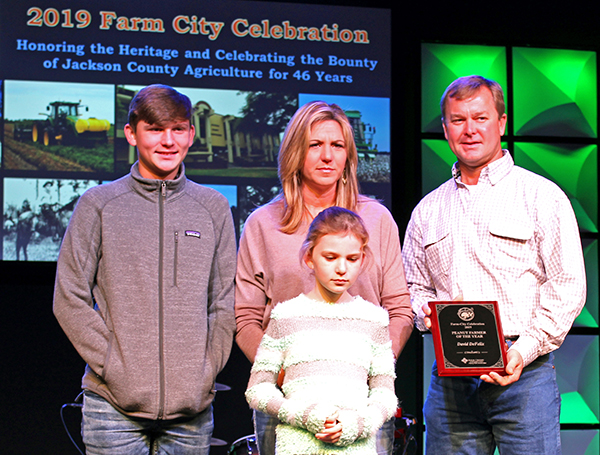
David DeFelix – 2019 Peanut Farmer of the Year
David DeFelix is a 4th generation farmer in Jackson County. David is a 1995 graduate of Graceville High School. Back when he first started farming, he used his Granddaddy’s tractors and equipment, but in 1997 he bought his first tractor. In 2006 David purchased his first center pivot irrigation unit. Over the last 10 years, he as gradually upgraded so that all the farmland he owns is irrigated. Much of the land he rents is dryland, but he has established enough irrigated land that 50% of the total cropland he farms is irrigated.
David farms 1,200 acres, comprised of peanut, cotton and corn. He has a three-year peanut/cotton rotation. This year, he had about 350 acres planted in peanut. He grew two varieties this year: TufRunner 297 and FloRun 331, both on 36” single rows. There were 160 acres of 297 on irrigated land, and then 190 acres of 331 that were dryland. Last year he had some 331’s that performed very well without irrigation, and he felt that they were a good fit for his farm on dryland acres. Typically, about half of his peanut crop is grown for seed peanuts, and the other half for the market. This year, all 350 acres were grown for Florida Foundation Seed. Currently, the farm average is about 4,500 lbs./ac, dryland/irrigated combined. He practices conservation tillage and normally plants triticale as a cover crop at the end of the season.
David is a member of the Florida Peanut Producers Association and is also a member of Sowega Cotton Gin. He serves on the state board for the Florida Peanut Producers Association and has been on the National Cotton Board since 2011.
Over the past 20 years, David’s farming business has survived both good and hard times. When asked if he had any thoughts that he’d like to share regarding farming, he laughed and said, “Embrace the struggle.” He also said that, “Trent and Sarah Catherine (his two kids), worked nearly every day on the farm with him this summer and were a tremendous help. Six hands are better than two.” However, he was a little depressed on the first day of school, he said “I lost my help and my entertainment all in the same day.”
David has been married to his wife Kim for 9 years. She pulls quadruple duty helping David farm, ranch, raise a family, and manages the family parts business which has grown to include 20 stores spanning from Florala, Alabama to Tallahassee, and from Albany, Georgia, to Port St. Joe. David says that he’s always needing something from the parts store and Kim never fails to bring it home or find it when no one else can.
The Peanut Farmer of the Year is selected annually by the Jackson County Extension Service with the assistance from the Florida Peanut Producers Association.
–
Todd & Amy Mason – 2019 Cotton Farmers of the Year
Todd is a second-generation Jackson County farmer. He has farmed all his life, starting at an early age with his father, Gerald Mason, and later branching out into his own operation in 2007. Growing up, he said, “There was a never a day off, always something different with the equipment auction, crops, or cows and he loved every minute of it.” Todd and his wife Amy will have been married for 13 years on their anniversary next month. Amy is the cornerstone of the farm. Todd says that he does the field work, what he considers the fun stuff, while she manages both the household and financial management of the farm. He said, “Without her I’d probably have to shut down.”
Their farm operation consists of 1,320 acres of cropland, with 760 acres planted in cotton this year. Todd said 675 of those acres were dryland production, with only 85 acres of irrigated cotton. The Masons grew three cotton varieties this year: PhytoGen 530, PhytoGen 580, and NexGen 5007. All of their cotton is strip tilled on a 36” row spacing. Todd said this year they are ahead of schedule. They finished with peanut harvest and have less than 250 acres of cotton left to pick. He said that last year’s cotton crop had looked much better prior to Hurricane Michael, but this year’s crop certainly did not disappoint with what he estimates to be a 2-bale average for the farm. Todd generally plants PhytoGen cotton varieties, which have produced great yields year after year. While he has been satisfied with their performance, this year he also tried some NexGen cotton. Approximately 100 acres were planted on some of their lower yielding land. So far, he has been very happy with its performance. In addition to cotton, they also grow seed peanuts for Florida Foundation Seed.
Helping Todd and Amy on the farm is their oldest son Bradley who is 15, Todd’s father Gerald Mason, and their friend George Weber, along with one or two extra workers at harvest. Todd and Amy are members of the Sowega Cotton Gin, the Florida Peanut Producers Association, Farm Credit of Northwest Florida, and Graceville First United Methodist Church.
The Masons wanted to take this opportunity to thank their friends and neighboring farmers who have helped them along the way. Back in 2014, Todd got very sick and was physically unable to harvest his crops. A group of friends and neighbors banded together to provide the labor and equipment needed to harvest the Masons’ crops and keep them in business. Todd said, “None of this would have been possible without God, Gerald & Sharon Mason, George and Maxine Weber, Harvey Harrell, Dexter Gilbert, Dave DeFelix, the Dietrich’s, Ronald Barber, Chris Jernigan, John Stuckey, Rob Burks and their wonderful family.” This group is a community of farmers that are always willing to pitch in to help each other whenever a need arises.
The Cotton Farmer of the Year is selected each year by the Jackson County Extension Staff with the assistance of the local agricultural supply dealers.
–
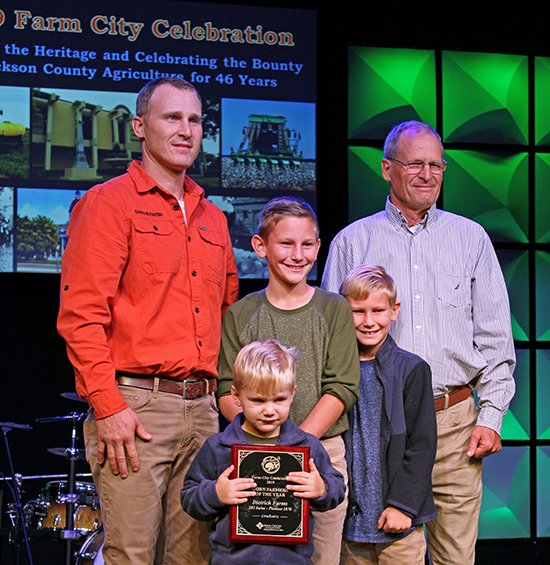
Dietrich Farms – 2019 Corn Farmers of the Year
Each year, the Jackson County Extension Service performs standardized corn yield checks across the county for all interested growers. Annually, the farm or grower with the highest yield check earns this award. This year’s recipient for Corn Farmers of the Year is Dietrich Farms.
Dietrich Farms is truly a family business. The matriarch of the family is Charlotte Dietrich. Gordon and Lady along with their son, Christopher and his wife Holly, all live on the farm, where they work and manage the farming operation. Gordon and Christopher handle the day to day activities on the farm. Lady is responsible for the bookkeeping. When Holly isn’t teaching 2nd grade at Kate Smith Elementary School, she helps out with the cattle, corn, and peanut harvest. Christopher and Holly have three sons: Jackson, Cale and J.B. and are expecting another son in January. The Dietrich Clan also consists of Hannah Dietrich Brock and her husband Mark, who live in Chipley. They have three children: Shelby, Cooper, and Cannon who help out with farm chores when they visit. Nicholas is no longer actively engaged in farming with his family. Since Hurricane Michael, his work in the Solar Industry, installing solar power systems for residential homes, has greatly expanded.
The Dietrichs strive to instill good work ethics with the youngest generation. The three older boys: Jackson & Cooper (10) and Cale (8) have all tried their hand at combining corn and running the grain cart. They help work cattle, pack cotton and level off peanuts. Shelby is the animal lover and the two youngest boys will start Pre-K next August, so they are getting all the tractor-time possible before going to school.
In 2019, the Dietrich Farms grew 310 acres of cotton, 290 acres of peanuts and 220 acres of corn, along 100 head of brood cows. Christopher says, “Corn fits nicely with our three-year rotational plan of peanuts and cotton. Corn may not always be the most profitable crop choice, but the benefits of rotational value are something we factor in.” On average, they grow about 220 acres of corn each year.
At Dietrich Farms, crops are grown on 30-inch row spacing, all their corn crop is irrigated and planted on single rows. This year’s planting dates were the last week of March and the crop was harvested the first 19 days of August. They grew 6 varieties on their farm: Dyna-Grow 57VC51, Dyna-Grow 58VC65, DeKalb 6208, DeKalb 6697, Pioneer 1847, and Pioneer 1870. The average corn yield for tests performed across different fields and varieties on Dietrich Farms in 2019 was 256 bu./acre. Their official top yield for 2019 was 284.77 bu./acre, achieved with Pioneer 1870. Behind the corn, they have planted oats, which they plan to use for grazing their cattle.
Fertility management is an important factor in a cropping system. They use anhydrous ammonium and they inject liquid nitrogen through the pivot. The Dietrichs use variable rate applications for lime and potash, and also utilize chicken litter to add organic matter and reduce costs. This year they also experimented with high and low plant populations of 34,000 and 38,000 plants, trying to gauge their farm’s yield potential at the different rates. This year, the Dietrichs have conducted their own field tests by comparing the same variety with and without an insecticide application to see how the yields compared. The Dietrichs feel that rotation, irrigation, and conservation tillage are key factors to any success they have achieved. They utilize the technology offered by soil moisture sensors placed in key areas of the field, especially with the corn crop to obtain optimum irrigating practices.
Dietrich Farms would like to give special thanks to Adam Scarborough, Helena Chemical, and Ronald Barber, Campbellton Farm Service, for their assistance with all their seed, fertilizer and chemical needs. Adam provides input on varieties and scouting for pests and disease, and all their fertilizer comes from Barber Fertilizer. They also use Mr. Barber’s moisture tester and scales during the yield checks.
The Corn Farmer of the Year Award is based on standardized yield checks provided by the Jackson County Extension Service.
–

Bill Conrad – 2019 Hay Farmer of the Year
Bill Conrad is a 4th generation Jackson County farmer. Over the years, he has raised a number of traditional crops: peanuts, soybeans, corn, wheat, triticale, and pine trees. For the past several years, however, he has shifted his focus to become a quality hay producer for horse, goat, beef and dairy farms.
Bill and his son, Joe, manage a very unique forage operation. They take great pride in producing high quality alfalfa, perennial peanut, and Bermudagrass hay. Currently, they are conducting an on-farm hay test to evaluate five alfalfa varieties to determine which will produce best in this area. Although their primary business is square-bale hay, they also provide custom hay harvest service of round-bale hay for farms in the area.
The Jackson County Hay Contest is based on locally grown hay with the highest Relative Forage Quality, or RFQ, score. RFQ is a single number index that takes into account protein, energy, fiber, and digestibility of hay, which allows for easy comparisons between cuttings and different forage types. An RFQ index of 100 is equal to very mature, or low-quality alfalfa hay.
In 2019, Bill sent in seven forage samples for quality testing. His best hay was an April cutting of alfalfa. Bill’s hay had an RFQ index of 231, with an estimated animal dry matter intake of 4% of body weight. The alfalfa peanut hay was preserved at 17% moisture, with 21% Crude Protein (CP), and 71% Total Digestible Nutrients (TDN), on a dry matter basis. This is the sixth year in a row that Bill has been recognized for having the highest quality hay in the county. In addition, Bill’s hay entries won first place in the Perennial Peanut Division, and placed third in the Alfalfa Division of the Southeast Hay Contest, at the Sunbelt Ag Expo.
The Hay Farmer of the Year is determined by the highest RFQ score for forage samples submitted each year by the Extension Service for quality testing to the University of Georgia’s Feed Lab.
–
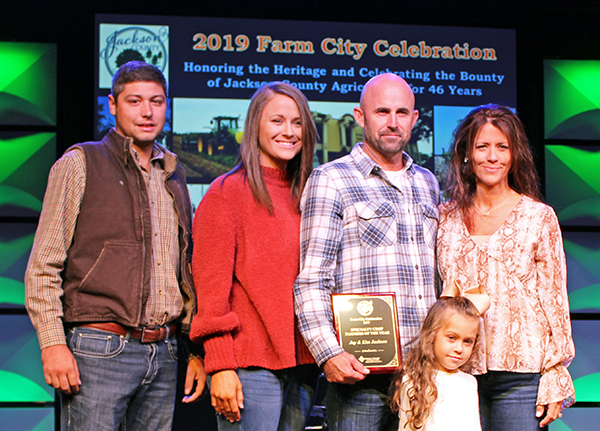
Jay and Kim Jackson – Specialty Crop Farmers of the Year
Jay Jackson is a 2nd generation produce farmer in Jackson County. In 1981, Jay’s father, Tommy, experimented with a one-acre U-Pick tomato operation to complement their watermelon and peanut farming operation. That first year was so successful, their operation soon grew to 100 acres of tomatoes. Jay took over the management of the farm in 1991 and made the decision to focus solely on fresh-produce farming.
Today, Jackson Farms raises tomatoes, watermelons, green peppers, squash and green beans. They sell wholesale produce to buyers from Texas to New York, with the majority going up the east coast. But even today, they still designate fields for U-Pick sales on the honor system. People from all around the tri-state region make an annual trek to pick their own fresh tomatoes for $9 per five-gallon bucket in June and October.
Jay and Kim are a true team after 30 years of marriage. Jay handles the farming, harvest, and packing. Kim is the office manager, in charge of meeting the food safety regulations and audits, payroll, and accounting. Neither would enjoy the other’s job, but together the two handle what 4-6 people do on larger vegetable operations. When asked about their work, Jay said, “Farming is not nostalgic like a country song. It takes 16 hour days – 7 days a week during planting and harvest. The only real break in the year comes in December.” By mid-January they jump right back into preparing for the spring crops. Jackson Farms employs six full-time workers and 50-60 seasonal workers for planting and harvest.
This dynamic duo has faced a number of challenges, but they still love what they do. Their greatest challenges are meeting ever tightening food safety and environmental regulations and dependable labor. Their number one concern is finding qualified labor in the future. Other industries are gobbling up available migrant labor with higher paying jobs. Most of their current workers have been coming back for the past 20-30 years, but when they lose an employee, it is getting harder and harder to replace them. Anyone can learn to pick fresh produce, but it takes real skill to harvest and pack efficiently and consistently. The last three years have been really difficult. In 2017, whiteflies brought diseases that wiped out their fall crops. Last year, Hurricane Michael destroyed their fall crop and their packing shed which just was rebuilt in June. Finally, this year conditions were some better, but even with irrigation the crops were stressed by the extreme heat and extended drought that reduced yields. Even with ideal weather, increasing competition with Mexico and Canada, and large corporate farms have depressed produce prices.
One of the great challenges with growing fresh vegetables is competing with weeds and soil nematodes. For years, methyl bromide was used as a fumigant to reduce these pests, but this chemical was taken off the market in the early 2000s because it was deemed an ozone depleter. Jay has been working for several years with Dr. Josh Freeman, UF/IFAS Vegetable Specialist in Quincy, to compare a wide range of new fumigants and plastics to develop systems to find solutions for these issues. When Dr. Freeman was asked about recognizing Jay, he said, “Jay has been an exceptional cooperator and I highly recommend him for this recognition.”
The Specialty Crop Farmer of the Year was selected by the Jackson County Extension Service with assistance from UF/IFAS Researchers and the local farming industry.
–
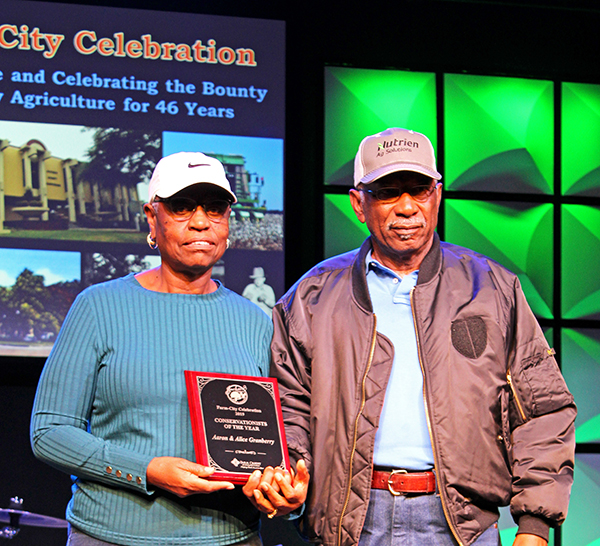
Aaron & Alice Granberry – Conservationists of the Year
In the early 1900s Aaron Granberry Sr. purchased 655 acres of land. He raised cattle, cotton, peanuts and corn. After his death, the land was divided between his children.
Aaron Jr. and Alice moved to Marianna in the early 2000s. They inherited family land and purchased additional land to start a cattle operation. Having been born and raised in a major city, it was a different experience for Alice to move to the country where there was so much open land. She decided to do some research on raising cattle and became excited about the idea of raising their own herd. One of the key resource agencies Alice discovered was the Natural Resource Conservation Service or NRCS, and the Environmental Quality Incentive Program or EQIP that provides cost-share funds to install approved conservation practices.
The cattle herd was started with purchased momma cows and calves. Over the years the Granberrys added young heifers to expand their herd, some of which are registered Angus. Today there are a total of 55 cows and two registered Angus bulls. As the herd grew there was a need for economical ways to provide feed in the most environmentally friendly means.
With the assistance of the EQIP cost sharing program, the Granberrys were able to take steps to ensure their cattle operation would be efficient, while also protecting the natural resources of their land. Through the EQIP program, the Granberry’s installed the following conservation practices: a well and pumping plant to provide a water source for livestock, a pipe system and erosion resistant water troughs for livestock, cross fences to increase their number of grazing cells, and a prescribed grazing plan, along with improved forage plantings to reduce soil erosion and also increase forage production on the farm. They also fenced off sinkholes to prevent run off contamination, because their land is in the Blue Spring Basin. GPS navigation is used on the tractors for precise fertilization and herbicide applications. The soil in the pastures and hay fields are tested every year prior to the spreading of any fertilizers, to ensure that only the necessary nutrients are added to the soil. Each pasture is part of a rotation plan to prevent over grazing. Manure is dragged after each rotation to prevent runoff and to quickly incorporate the nutrients back in the soil. The pastures are over-seeded with rye, ryegrass, and oats for winter grazing. While NRCS provided funding and technical assistance to develop the plans, the Granberrys recruited the help of their grandson, godson and temporary labor for installation of these practices.
The Granberrys are lifelong learners and are active members of the Jackson County Cattlemen’s Association. They regularly attend training classes provided by the Extension Service, Cattlemen’s Association, and USDA to enhance their knowledge and skills of recommended farm practices to improve efficiency and to protect the animal’s health and the environment. Alice received the training on the proper use and storage of chemicals to secure a restricted use pesticide license. They also annual attend the Sunbelt Ag to learn about new farm products and forage practices that are available in today’s market.
The Conservationist of the Year is selected each year by the staff of the Jackson District of the USDA’s Natural Resource Conservation Service (NRCS). There is still time to apply for the EQIP Program for funding in 2020. Farmers are encouraged to stop by the NRCS Office on Penn Ave and meet Corey Ware, our new District Conservationist, and his staff to complete an application.
–
Jackson County CARES Recognition
In 2001, the County Alliance for Responsible Environmental Stewardship, or CARES program, was created. Almost two decades later Farm Bureau continues to publicly recognize farmers and ranchers who demonstrate exemplary environmental protection by implementing Best Management Practices, or BMPs, on their farms and ranches. Through the implementation of BMPs, Florida farmers and ranchers have shown a sincere commitment to protecting our state’s environment and Farm Bureau is proud to recognize them for their efforts.
As part of the CARES program, recipients are awarded a customized This Farm CARES sign to display at their farm gate or on a nearby roadway. This sign helps demonstrate to the general public that Florida agriculture is committed to protecting local natural resources. To date, more than 800 Florida farm families proudly display a CARES sign on their property.
Farm Bureau partners with both the Florida Department of Agriculture and Consumer Services as well as the University of Florida/IFAS for the CARES program. Justin Bryan, FDACS Office of Ag Water Policy, and Billy Bigham, Jackson County Farm Bureau presented the CARES Awards to the following farms in 2019.
–
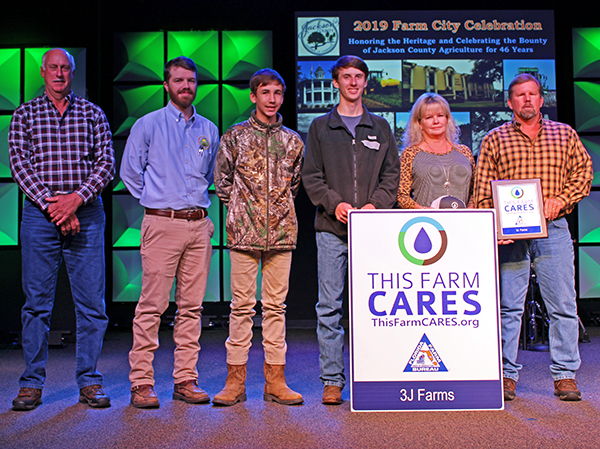
3J Farms
3J Farms is owned and operated by brothers, Mike, John and Steve Jordan. Together, these fourth generation families produce peanuts, cotton and pickle cucumbers in Bascom. Since 2015, they have implemented BMPs to help accomplish their goals of protecting the natural resources and property, which lies inside of the Blue Springs Basin. They believe environmental protection is simply the right thing to do. Some of the most effective BMPs implemented include utilizing the Mobile Irrigation Lab to convert to low pressure irrigation systems, thus reducing overall water use. They also work closely with a certified crop consultant who analyzes the nutrient needs of specific crops. To protect water quality and also soil health, they plant cover crops and also use conservation and strip-tillage. Buffers and field border also help filter excessive nutrients.
Florida Farm Bureau is proud to award 3J Farms a 2019 CARES designation and sign, because 3J Farms Cares.
–
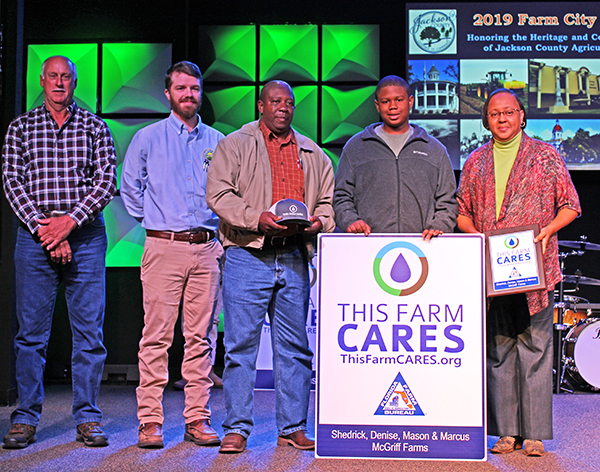
McGriff Farms
The second recipient to be recognized is McGriff Farms, operated by Shedrick, Denise, Mason, and Marcus McGriff. The McGriffs produce corn, peanuts, cotton, peas and oats near Bascom. He continues to invest in environmental protection efforts in order to protect and preserve local water resources. Some of the most effective BMPs implemented since 2014 include using variable rate fertilizer application to precisely apply nutrients exactly where needed. He also regularly samples soil around the property in order to analyze the nutritional content and make decisions towards nutrient management. Cover crops are planted to help retain soil moisture and and improve soil health.
Florida Farm Bureau is proud to award McGriff Farms a 2019 CARES designation and sign, because McGriff Farms Cares.
–
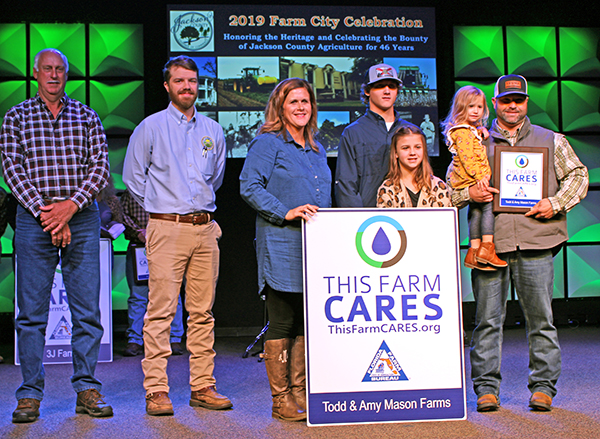
Mason Farms
Our final recipient to recognized is Todd & Amy Mason of Mason Farms. Mason produced peanuts and cotton from the farm’s inception. Environmental protection has been a major priority to this farm family. Some of the most effective BMPs implemented included strip tillage to protect soil health. Soil samples are also regularly taken to help guide nutrient management decisions for the upcoming growing season. Field borders are also maintained to capture excessive nutrient attempting to runoff as well as provide habitat for wildlife.
Florida Farm Bureau is proud to award Todd and Amy Mason with a 2019 CARES designation and sign, because Mason Farms Cares.
 0
0


